How to develop Android native plug-ins in Uniapp? The following uniapp tutorial column will introduce you to the Uniapp Android native plug-in development method. I hope it will be helpful to everyone!

##Android
Environment preparation
l JAVA environment jdk1.8l Android Studio download address:Android Studio official website OR Android Studio Chinese community
l App offline SDK download : Please download the 2.9.8 version ofImport the uni plug-in native project
l UniPlugin-Hello -AS project please searchl in App Offline SDK
and click Android Studio menu option File--->New--->Import ProjectApp Offline SDK

Plug-in development
uni-app plug-in currently only supports Module extension and Component Extension, Adapter extension is not supported for the time being. The following is the Module extension (non-UI function extension)1. Create a new Module, File->New->New Module, select Android Library, fill in the information, Click Finish
移除默认依赖,修改为
compileOnly fileTree(dir: 'libs', include: ['*.jar'])\
compileOnly fileTree(dir: '../app/libs', include: ['uniapp-v8-release.aar'])\
compileOnly "com.android.support:recyclerview-v7:28.0.0"\
compileOnly "com.android.support:support-v4:28.0.0"\
compileOnly "com.android.support:appcompat-v7:28.0.0"\
compileOnly 'com.alibaba:fastjson:1.1.46.android'\
implementation 'com.facebook.fresco:fresco:1.13.0'


- What we implement is a Module, which needs to inherit UniModule
- The extension method must be added

- ##The first parameter is the incoming parameter, the structure is json, the required parameters are obtained through key, the second is the callback function, used to return Give the results required by the front page
- If you need to use other permissions, you need to apply in the AndroidManifest.xml file, such as calendar reading and writing

- Edit the "app" Module root directory assets/dcloud_uniplugins.json file under the UniPlugin-Hello-AS project, in the nativePlugins node Register below, type: module, name fill in the name of the component you need to expose, class fill in the specific path of the method, package name + class name
 dcloud_uniplugins.json description:
dcloud_uniplugins.json description:
nativePlugins: 插件根节点,可存放多个插件 hooksClass: 生命周期代理(实现AppHookProxy接口类)格式(完整包名加类名) type : module 或 component类型 name : 注册名称 class : module 或 component 实体类完整名称Register your own component in the app's build.gradle. The name is the name of the new module. When registering, you can use it in android studio
 The code development is over now. The next step is to use android studio to verify the offline package. Portal
The code development is over now. The next step is to use android studio to verify the offline package. Portal
- The current uniapp related packaging information needs to be prepared. I won’t go into details here. AppKey, APPID and Android package name all need to be configured accordingly in android studio, as well as Android certificate aliases and secret keys, etc.

- Click Release->Local Packaging->Generate locally packaged App resources

- ##Copy and paste the generated file into UniPlugin-Hello-AS\app\src\main\assets\apps, and modify the appid of the dcloud_control.xml file

- Android packaging parameter configuration, package name, certificate alias, etc. (Figure 1), the certificate file needs to be placed under the app (Figure 2) AndroidManifest.xml configures the package name and AppKey, which is the second step above AppKey





##Uniapp Packaging

HBuildX introduces the plug-in
Create nativeplugins in the project root directory-->plug-in name->android->plug-in aar file, synchronized storage under android
package.json (detailed introduction)
##Cloud packaging for plug-in function verification
IOS
The first step is to buy a Mac
More For more programming-related knowledge, please visit: Introduction to Programming! !
The above is the detailed content of A brief discussion on how to develop Android native plug-ins in Uniapp. For more information, please follow other related articles on the PHP Chinese website!
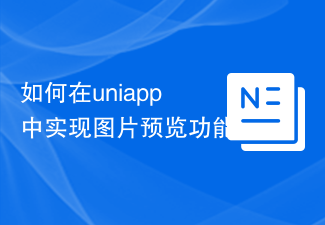 如何在uniapp中实现图片预览功能Jul 04, 2023 am 10:36 AM
如何在uniapp中实现图片预览功能Jul 04, 2023 am 10:36 AM如何在uni-app中实现图片预览功能引言:在移动应用开发中,图片预览是一项常用的功能。在uni-app中,我们可以通过使用uni-ui插件或自定义组件来实现图片预览功能。本文将介绍如何在uni-app中实现图片预览功能,并附带代码示例。一、使用uni-ui插件实现图片预览功能uni-ui是由DCloud开发的一套基于Vue.js的组件库,提供了丰富的UI组
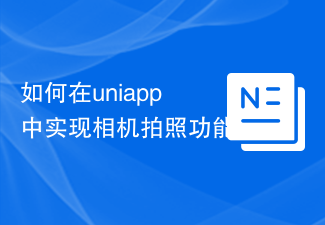 如何在uniapp中实现相机拍照功能Jul 04, 2023 am 09:40 AM
如何在uniapp中实现相机拍照功能Jul 04, 2023 am 09:40 AM如何在uniapp中实现相机拍照功能现在的手机功能越来越强大,几乎每个手机都配备了高像素的相机。在UniApp中实现相机拍照功能,可以为你的应用程序增添更多的交互性和丰富性。本文将针对UniApp,介绍如何使用uni-app插件来实现相机拍照功能,并提供代码示例供参考。一、安装uni-app插件首先,我们需要安装一个uni-app的插件,该插件可以方便地在u
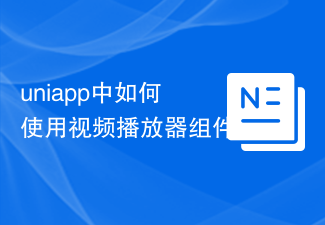 uniapp中如何使用视频播放器组件Jul 04, 2023 am 10:13 AM
uniapp中如何使用视频播放器组件Jul 04, 2023 am 10:13 AMuniapp中如何使用视频播放器组件随着移动互联网的发展,视频已成为人们日常生活中不可或缺的娱乐方式之一。在uniapp中,我们可以通过使用视频播放器组件来实现视频的播放和控制。本文将介绍如何在uniapp中使用视频播放器组件,并提供相应的代码示例。一、引入视频播放器组件在uniapp中,我们需要先引入视频播放器组件才能使用它的功能。可以通过在页面的json
 手把手教你uniapp和小程序分包(图文)Jul 22, 2022 pm 04:55 PM
手把手教你uniapp和小程序分包(图文)Jul 22, 2022 pm 04:55 PM本篇文章给大家带来了关于uniapp跨域的相关知识,其中介绍了uniapp和小程序分包的相关问题,每个使用分包小程序必定含有一个主包。所谓的主包,即放置默认启动页面/TabBar 页面,以及一些所有分包都需用到公共资源/JS 脚本;而分包则是根据开发者的配置进行划分,希望对大家有帮助。
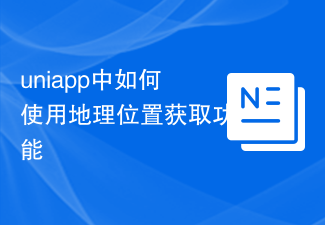 uniapp中如何使用地理位置获取功能Jul 04, 2023 am 08:58 AM
uniapp中如何使用地理位置获取功能Jul 04, 2023 am 08:58 AMuniapp是一种基于Vue.js的跨平台开发框架,它可以同时开发微信小程序、App和H5页面。在uniapp中,我们可以通过使用uni-api来访问设备的各种功能,包括地理位置获取功能。本文将介绍在uniapp中如何使用地理位置获取功能,并附上代码示例。首先,在uniapp中使用地理位置获取功能,我们需要在manifest.json文件中申请权限。在man
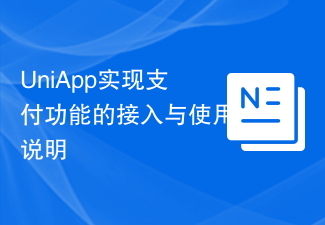 UniApp实现支付功能的接入与使用说明Jul 04, 2023 am 10:27 AM
UniApp实现支付功能的接入与使用说明Jul 04, 2023 am 10:27 AMUniApp实现支付功能的接入与使用说明随着移动支付的普及,很多应用都需要集成支付功能,以方便用户进行在线支付。UniApp作为一种基于Vue.js的跨平台开发框架,具有一次开发多平台使用的特点,可以轻松地实现支付功能的接入。本文将介绍UniApp中如何接入支付功能,并给出代码示例。一、支付功能的接入在App端的manifest.json文件中添加支付权限:
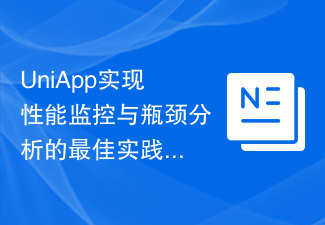 UniApp实现性能监控与瓶颈分析的最佳实践Jul 04, 2023 am 08:46 AM
UniApp实现性能监控与瓶颈分析的最佳实践Jul 04, 2023 am 08:46 AMUniApp实现性能监控与瓶颈分析的最佳实践随着移动应用的快速发展,开发人员对应用性能的需求也日益增加。对于UniApp开发者来说,实现性能监控和瓶颈分析是非常重要的一项工作。本文将介绍UniApp中实现性能监控和瓶颈分析的最佳实践,并提供一些代码示例供参考。一、性能监控的重要性在现代移动应用中,用户体验是非常重要的。性能问题会导致应用加载速度慢、卡顿等问题
 UniApp实现视频播放与录制的集成与使用技巧Jul 04, 2023 am 11:07 AM
UniApp实现视频播放与录制的集成与使用技巧Jul 04, 2023 am 11:07 AMUniApp实现视频播放与录制的集成与使用技巧UniApp是一款跨平台的应用开发框架,可以用于开发微信小程序、H5站点、APP等多个平台。在UniApp中实现视频播放与录制是非常实用的功能之一。本文将介绍UniApp中如何集成和使用视频播放与录制的技巧,同时提供相应的代码示例。一、视频播放集成与使用在UniApp中实现视频播放可以使用uni-mp-video


Hot AI Tools

Undresser.AI Undress
AI-powered app for creating realistic nude photos

AI Clothes Remover
Online AI tool for removing clothes from photos.

Undress AI Tool
Undress images for free

Clothoff.io
AI clothes remover

AI Hentai Generator
Generate AI Hentai for free.

Hot Article

Hot Tools

ZendStudio 13.5.1 Mac
Powerful PHP integrated development environment

SAP NetWeaver Server Adapter for Eclipse
Integrate Eclipse with SAP NetWeaver application server.

EditPlus Chinese cracked version
Small size, syntax highlighting, does not support code prompt function

DVWA
Damn Vulnerable Web App (DVWA) is a PHP/MySQL web application that is very vulnerable. Its main goals are to be an aid for security professionals to test their skills and tools in a legal environment, to help web developers better understand the process of securing web applications, and to help teachers/students teach/learn in a classroom environment Web application security. The goal of DVWA is to practice some of the most common web vulnerabilities through a simple and straightforward interface, with varying degrees of difficulty. Please note that this software

Atom editor mac version download
The most popular open source editor









